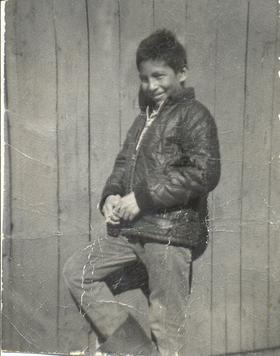Chanie Wenjack
Article about Chanie Wenjack
Chanie Wenjack[edit | edit source]
Chanie Wenjack was an Anishinaabe boy from Canada who became a symbol of the tragic legacy of the Canadian Indian residential school system. His death in 1966 sparked national attention and led to increased awareness and dialogue about the treatment of Indigenous peoples in Canada.
Early Life[edit | edit source]
Chanie Wenjack was born on January 19, 1954, in Ogoki Post, a small community in northern Ontario. He was a member of the Ojibwe tribe, part of the larger Anishinaabe group. Wenjack grew up in a traditional Indigenous environment, learning the customs and language of his people.
Residential School[edit | edit source]
In 1963, at the age of nine, Chanie was sent to the Cecilia Jeffrey Indian Residential School in Kenora, Ontario. The school was part of the Canadian Indian residential school system, which aimed to assimilate Indigenous children into Euro-Canadian culture. The conditions at the school were harsh, and the children were often subjected to physical and emotional abuse.
Escape and Death[edit | edit source]
On October 16, 1966, Chanie Wenjack ran away from the residential school, attempting to return to his home over 600 kilometers away. He followed the Canadian National Railway tracks, hoping they would lead him back to his family. Tragically, on October 22, 1966, his body was found near the tracks, having succumbed to exposure and hunger.
Legacy[edit | edit source]
Chanie Wenjack's death became a catalyst for change in Canada. His story was brought to national attention by a 1967 article in Maclean's magazine, which highlighted the harsh realities of the residential school system. In 2016, Canadian musician Gord Downie released "Secret Path", an album and graphic novel dedicated to Wenjack's memory, further raising awareness about his story and the broader issues faced by Indigenous communities.
Related pages[edit | edit source]
Search WikiMD
Ad.Tired of being Overweight? Try W8MD's NYC physician weight loss.
Semaglutide (Ozempic / Wegovy and Tirzepatide (Mounjaro / Zepbound) available. Call 718 946 5500.
Advertise on WikiMD
|
WikiMD's Wellness Encyclopedia |
| Let Food Be Thy Medicine Medicine Thy Food - Hippocrates |
Translate this page: - East Asian
中文,
日本,
한국어,
South Asian
हिन्दी,
தமிழ்,
తెలుగు,
Urdu,
ಕನ್ನಡ,
Southeast Asian
Indonesian,
Vietnamese,
Thai,
မြန်မာဘာသာ,
বাংলা
European
español,
Deutsch,
français,
Greek,
português do Brasil,
polski,
română,
русский,
Nederlands,
norsk,
svenska,
suomi,
Italian
Middle Eastern & African
عربى,
Turkish,
Persian,
Hebrew,
Afrikaans,
isiZulu,
Kiswahili,
Other
Bulgarian,
Hungarian,
Czech,
Swedish,
മലയാളം,
मराठी,
ਪੰਜਾਬੀ,
ગુજરાતી,
Portuguese,
Ukrainian
Medical Disclaimer: WikiMD is not a substitute for professional medical advice. The information on WikiMD is provided as an information resource only, may be incorrect, outdated or misleading, and is not to be used or relied on for any diagnostic or treatment purposes. Please consult your health care provider before making any healthcare decisions or for guidance about a specific medical condition. WikiMD expressly disclaims responsibility, and shall have no liability, for any damages, loss, injury, or liability whatsoever suffered as a result of your reliance on the information contained in this site. By visiting this site you agree to the foregoing terms and conditions, which may from time to time be changed or supplemented by WikiMD. If you do not agree to the foregoing terms and conditions, you should not enter or use this site. See full disclaimer.
Credits:Most images are courtesy of Wikimedia commons, and templates, categories Wikipedia, licensed under CC BY SA or similar.
Contributors: Prab R. Tumpati, MD

